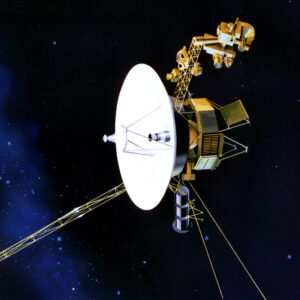FAR, FAR AWAY, A FEISTY BIT OF TECHNOLOGY OUT-HUMANS US
Strange as it may sound, I have come to think of a spacecraft as a person. In a quest to satisfy that most basic human characteristic, curiosity, Voyager 1 is defying expectations and seemingly impossible odds with dogged determination.
Now more than 24-billion kilometers from Earth and still going, Voyager also epitomises the contradictions in the human intelligence that created it.

In the 47 years that the multi-angled contraption the size of a Ford Fiesta or a Kia Yaris has been “out there”, technology has advanced so much that the computer in an iPhone is 200,000 times faster and has about 250,000 times more memory than the hardware on Voyager.
And what do five billion people a day do with their with iPhones and similar devices? Among other things and mostly, hold them in one hand and stare at social media sites like TikTok and its ilk.
Voyager, on the other hand, is running on fumes and still, to steal a line from the musical “Man of La Mancha”, striving “To reach the unreachable stars”, all the while doing what controllers at NASA describe as “science that can’t be readily duplicated”.
Meanwhile, back on Earth, some “scientists” are busy multiplying the last thing we need.
In 2023, the nine nuclear powers increased spending on their arsenals by $10-billion to $91,393,404,739 – the equivalent of $2,898 a second.
By way of perspective, the world’s shortfall in humanitarian aid for 2023 was $37-billion.
But it may not matter, because, “The danger of an accidental launch grows when great powers keep their nuclear weapons on launch-ready alert, as the United States and Russia still do today.”
REACHING OUT
That tidbit isn’t on the “Golden Record” that Voyager is carrying.

Compiled by a committee headed by astronomer Carl Sagan, it includes greetings in 55 languages, sounds of surf, whale songs and music ranging from Beethoven to Chuck Berry and a Navaho chant.
There are also instructions for playing it, in case Voyager encounters an intelligent species curious about life on Earth.
One has to wonder what a species capable of deciphering the record would make of beings who think “bump stocks” for semi-automatic rifles are within the bounds of common sense, never mind make them legal.
Turning guns you can buy over the counter into weapons of war isn’t a clear indication of anything but insecurity, fear, aggression and irrationality. As Washington Post columnist E.J. Dionne pointed out, by quibbling over how the word “function” applies to bump stocks, the U.S. Supreme Court valued dictionaries over human lives.
ON THE WAY TO HEAVEN?
On a more sublime level, in an essay musing on what the Voyager space probes can teach humanity about immortality and legacy, Professor Emeritus James Edward Huchingson, wrote: “Religious and spiritual people can find solace in the belief that God or an afterlife waits for them after death. For the secular, hoping that someone or something will remember humanity, any wakeful and appreciative aliens will have to do.”
With a life expectancy of more than a trillion years, Voyager is as close to immortal as anything made by humans is likely to get.
I wonder how that sits with conservative Christians who believe science be damned and only they know the way to heaven, like those who successfully campaigned for every public classroom in Louisiana to display the Ten Commandments.
If it stands up to legal objections, maybe they could send one of the posters to the Gateway mega church in Texas, whose founder had to resign over allegations he abused a 12 year old girl. Church elders reportedly knew about an extramarital relationship but thought it was with a “young lady.”
So much for the adultery commandment.
What I, and no doubt many others don’t understand, is while science has made leaps that strain imagination since Voyager was created, some humans in a position to use the advances to make a difference to what we know is finite mortality, seem to care only about what will make them more money.
Prime Example 1: “South Africa’s public health care system has run out of the human insulin pens that it provides to people with diabetes, as the pharmaceutical industry shifts production priorities to blockbuster weight-loss drugs that use a similar device for delivery.”
The more I think about it, the more I like the idea of seeing Voyager as human. Certainly it’s a better representation of the best our species can be than some sentient and mortal beings.
Comments are welcomed. Click CONTACT on the site header.
To receive e‑mail alerts to new posts, Click SIGN-UP on the header.
2 thoughts on “FAR, FAR AWAY, A FEISTY BIT OF TECHNOLOGY OUT-HUMANS US”
Again, nicely done, Allen.
BTW, I covered the Voyager program at its start. I spoke with Sagan at least a half dozen times about the mission, and he always complained about how CBS News did not pay enough attention to spaceflight in general and this mission specifically. He, Morley Safer and I had lunch at JPL a few years later when 60 Minutes was looking into a piece about Mars, and he was still complaining then. But I remained a great admirer of Sagan, and I went to his memorial service in 1997. One of the speakers summed Sagan up well when she recounted a conversation that they had had: ”He would say to me, ‘You are so smart, why do you believe in God?’ ”And I’d say, ‘You are so smart, why don’t you believe in God?’ ”
Good questions both. Thanks Mark.